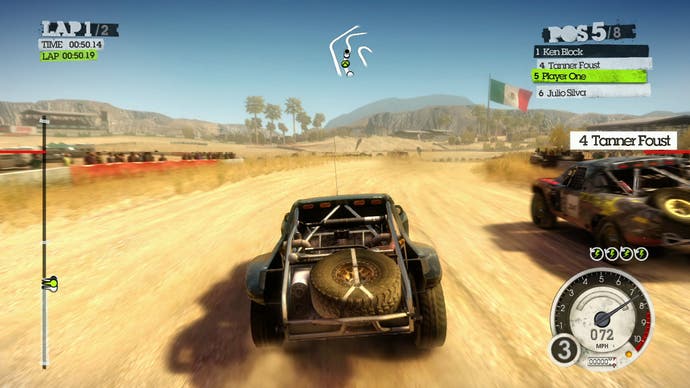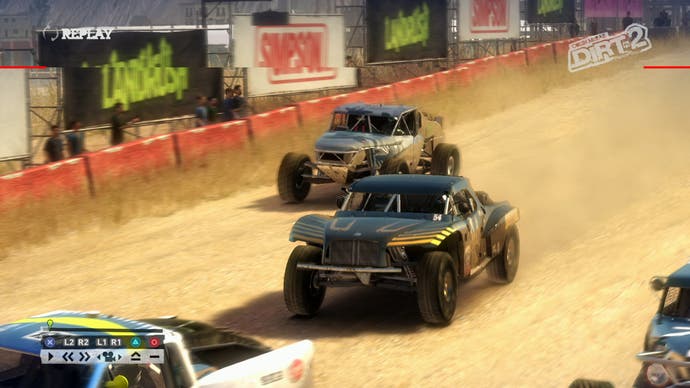DiRT 2 demo: PS3/Xbox 360 performance showdown
Digital Foundry does its thing.
We've already taken a look at the underlying tech in DiRT 2 based on the initial b-roll Codemasters supplied to Eurogamer TV, but last week's release of the playable demo was the first hands-on experience we've had with the console versions of the new McRae game.
Powered by Codemasters' own EGO engine (in itself, an off-shoot of the multi-platform Phyre tech being championed in dev circles by Sony), DiRT 2 appears to be using essentially the same technological underpinnings as last year's Race Driver: GRID. So in terms of the basic brass tacks of the visuals, you're looking at native 720p for both versions, with the Xbox 360 using top-end 4x multisampling anti-aliasing to give a very clean presentation, while the PS3 drops down to 2x - an effect not quite so pronounced in this new game as it was in GRID.
You'll doubtless spot a few minor presentational differences between the visuals in the game as you check out the analysis video, in particular in the way that transparent alpha textures are handled. On PS3, you'll notice an almost interlacing-type effect (known as alpha to coverage) which reduces the amount of fill rate and bandwidth used on transparent effects. Aside from a few other minor, almost imperceptible visual differences, the games are closely matched... with one exception.
Yes, similar to GRID, the biggest dividing line between the two games once again comes down to the v-sync issue, with the PS3 game once again demonstrating a tangibly larger amount of torn frames. It is noticeable on scenes packed with cars, but most impactful on the replays. Xbox 360 is also prone to dropping out of v-sync to maintain frame-rate, but it clearly happens far less often.
However, during in-game, you can easily be forgiven for not noticing so much of the tearing on the PS3 version, and it is an interesting example of how the mathematical certainties of automated analysis do not always tally with the perceptions of the human eye. Sometimes a game simply looks cleaner than it actually is... it's all about the context.
Generally speaking, where you're most likely to see a torn frame is in big, scene-changing effects (enormous explosions, Gears of War style, for example). Or, with fast lateral movement where parts of the swiftly moving scenery appear to "hang" in the air longer than they should do. Additionally, the further away from the centre of the screen the tear occurs, typically the less likely it is to be picked up by the human eye during intense gameplay, depending on context of course. Plus of course, most HDTVs still bizarrely operate with an overscan area, and tearing top and bottom that occurs in these areas will of course be invisible.


When you're playing without the dashboard view in DiRT 2, a significant amount of the screen is taken up by the game's skybox, with only a limited amount of scenery encroaching into this area. Tears in this area will be much harder to spot, especially when you're travelling "into" the screen with little in the way of fast lateral movement.
Overall then, while engine performance seems to be in much the same ballpark as GRID on both versions, whether by accident or design, image consistency appears to be improved in the PS3 version of the new game.
DiRT 2 code is arriving too late to factor into Face-Off 21, but expect a deeper analysis of some description once the full retail version has arrived.

